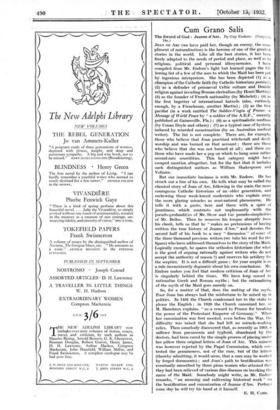Cum Grano Sails JOAN OF Astc (we have paid her,
though an enerny, the com- pliment of naturalization) is the heroine of one of the greatest stories in the world. Like all the best stories, it has been freely adapted to the needs of period and place, as well as to religious, political and personal idiosyncrasies. I have compiled from Mr. Endore's light but learned pages the fol- _ lowing list of a few of the uses to which the Maid has been put by. ingenious interpreters. She has been depicted- (1) as a chanipion of the Catholic faith (by Catholic historianS passim); defender of primaeval Celtic culture and Druidic religion against invading Roman clericalism (by Henri Martin) ; (3) as the foUnder of French nationality (by Michelet) ; (4) as the first begetter of international hatreds (also, - curiously enough, by a Frenchman, another Martin) ; (5) as the first pacifist (in a work entitled The Soldier-Virgin of Prance--a Message of Mirld Peace by " a soldier of the A.E.F.," recently published at Gainesville, Fla.) ; (6) as a spiritualistic medium (by Conan Doyle and others) ; (7) as a typical case of hysteria induced by retarded menstruation (by an Australian medical writer). The list is not complete. There are, for example, those who belieVe that Joan practised witchcraft and devil- worship and was burned 'on that account ; there are those who believe that she was not burned at all ; and there are those who have made her a peg on which to hang some rather second-rate scurrilities. This last category might have escaped mention altogether, but for the fact that it includes such distinguished authors as William Shakespeare and Voltaire.
But our immediate business is with Mr. Endore. He has struck out a line of his own. He tells what may be called the classical story of Joan of Arc, following in the main the more courageous Catholic historians of an •older generation, and eschewing those weak-kneed modernists who explain away the more glaring miracles as semi-natural phenomena. He tells it with a gusto, here and there with a spice of jauntiness, which contrasts not unpleasantly with the pseudo-profundities of Mr. Shaw and the pseudo-simplicities of Mr. Belloc. Then he removes his tongue abruptly front his cheek, tells us that be " makes no pretensions of having written the true history of Jeanne d'Are," and devotes the second half of his book to a racy " discussion " Of some of the three thousand previous writers (we take his word for the figure) who have addressed themselves to the story of the Maid. Logically enough, he spares the orthodox historians (for what is the good of arguing rationally against writers who do not accept the authority of reason ?) and reserves his artillery for the sceptics. It is not a difficult game ; for your sceptic is as 'a rule inconsistently dogmatic about his own conclusions. Mr. Endore snakes you feel that modern criticism of.Joan of Arc is singularly behind the times. We have long ceased to rationalize Greek and Roman myths ; but the rationalizing of the myth of the Maid goes merrily mi.
So, for a matter of that, does the making of the myth. Poor Joan has always had the misfortune, to be mixed up in polities. lii 1431 the Church condemned her to the stake to please the English ; in 1920 the Church canonized her, as M. Hanotaux explains, " as a reward to France for breaking the power of the Protestant Emperor of Germany." When her canonization was first mooted, even before the War, the difficulty was "raised that she had left no miracle-working relics. Then somebody discovered that, as recently as 1905. a sufferer from pneumonia and typhoid, abandoned by the dOetars, had been cured by the simple prOcess of placing under her pillow three original letters of Joan Of Arc. This miracie was however rejected by the Papal Commission, which con- -tested the genuineness, not of- the cure, but of the lettets (thereby EidMitting, it would seem, that a cure may be worked by forged documents) ; and Joan's path to beatification was eventually smoothed by three pious women who attested that they had been relieved of various dire diseases on invoking the mime of the Maid. Somebody might write, as Mr. Endore remarks, " an amusing arid enlivening historical work " on the beatification and canonization of Jeanne d'Are. Perhaps some day he will try his hand at it himself.
- E. IL -t..tan.


























































 Previous page
Previous page